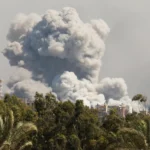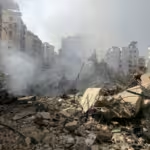The most recent Iranian missile strike against Israel represents a new elevation of the conflicts plaguing the region. However, beyond the immediate impact, actions from Tehran need to be understood against the backdrop of a comprehensive strategy intended to further nuclear ambitions. Iran has gotten closer than at any other time to making a nuclear weapon, and this attack may represent a ploy to bargain its way into a better position during negotiations. Whether Israel retaliates by striking Iranian nuclear facilities is not known, but a full-scale war seems only a matter of time, not if, as the stakes continue to rise.
Iranians quickly resumed uranium enrichment after the U.S. withdrawal under President Trump from the 2015 nuclear deal and have since surpassed that agreement’s limits on enrichment levels. Now closer to nuclear capability, Tehran has ignored restrictions while trying to avoid provoking a full-scale U.S. or Israeli strike. Iran’s position is further bolstered by its growing ties with Russia, which has reportedly aided Tehran in exchange for Iranian support in military conflicts, including the provision of drones to Moscow.
Iran’s role in the war—limited but effective—appears to be a strategic step on its part to push the West, particularly the U.S., back to the negotiating table. Through direct military actions, as was the recent missile strike, Tehran is conveying this point: it will not roll over. It will take conversation over conflict but will not hesitate to defend its interests. Iran’s recent diplomatic forays- such as President Pezeshkian’s call for dialogue at the UN General Assembly- indicate that Tehran wants to resolve the nuclear standoff on its terms, permitting it to advance its nuclear program.
Not much difference is perceived in the intent of the Iranian regime under the leadership of the Supreme Leader. He appears to be willing to let President Pezeshkian strain at the leash for diplomacy, but he is not interested in changing the final goal: nuclear capability. Iran’s missile strike on Israel serves as a reminder to the West that if there are no concessions, the situation could go downhill fast, and even any possibility of returning to stability before the war would be lost.
An Israeli response is an all-too-present possibility. Tel Aviv has considered Iran’s efforts to build nuclear weapons an existential threat for some time, and there have already been limited strikes on Iranian facilities once without coordination with Washington, of course, to prevent all-out war. Tehran’s latest strike might force Tel Aviv to consider even more extreme measures, perhaps by targeting critical nuclear sites. This would likely escalate into a war involving more of the region, but it may be the only way to stop Tehran’s nuclear march, which the current sanctions have not halted.
Regional power and influence are non-negotiable for Iran; its interference in Lebanon, Yemen, and Gaza is part of a larger pattern of consolidating regional supremacy, and its nuclear program is essential to maintaining that position. Iran’s goals are about more than even military power; ideological commitment to exporting the Islamic Revolution continues to be a significant feature of Iran’s foreign policy. Tehran aspires to project its power throughout the Middle East region, taking its position as one of the regional leaders among Muslim-majority nations.
Still, the West, led by Washington, has been highly adamant against an Iran with nuclear capability. Cautious of any step that may ignite more conflict, the Biden administration still does not wish to trigger all-out war but, given that this is the issue of Israel’s security, cannot continue with the situation for long. Suppose it comes before the 2024 U.S. elections. In that case, when hawks may return in the form of President Trump, the complexity increases further because Trump himself has been tough on policy decisions regarding Iran.
The continuing war and this round of Iranian missile strikes on Israel point to an even broader reality: Tehran’s nuclear ambitions can no longer be overlooked. This war in the region has a meager chance of ending without saying what Iran’s role has been or without developing a sense that, whether through diplomacy or military action, what is going on there represents the fundamental challenges facing the entire region, and thus directly shapes the future of Middle East geopolitics. Iran’s gamble might well be forcing the West to come in, but the risk-laden road to peace endures as the region stands at the threshold of an even more significant, potentially catastrophic war.















